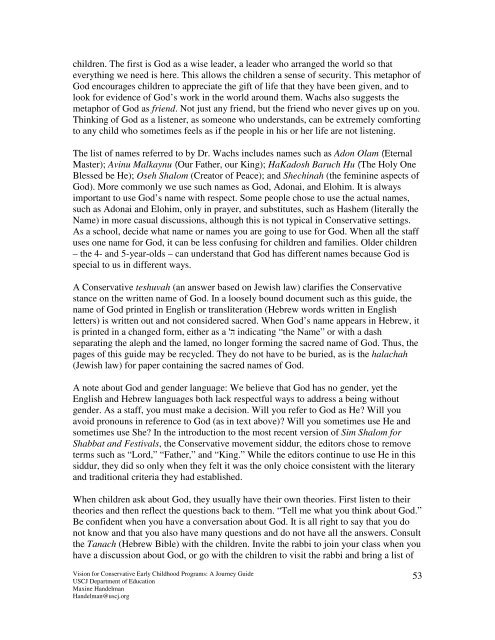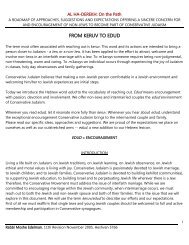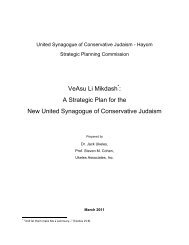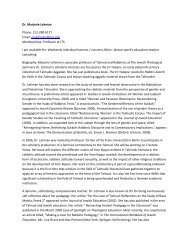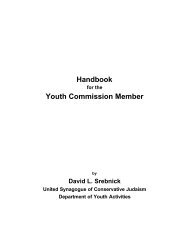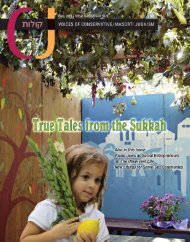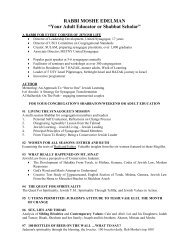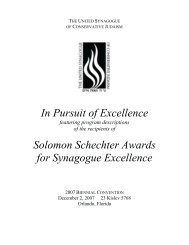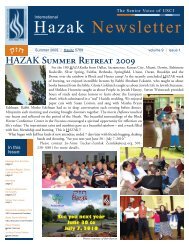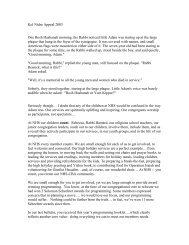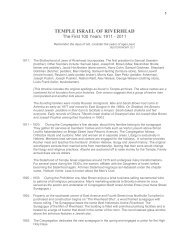Vision for Conservative Early Childhood Programs: A Journey Guide
Vision for Conservative Early Childhood Programs: A Journey Guide
Vision for Conservative Early Childhood Programs: A Journey Guide
Create successful ePaper yourself
Turn your PDF publications into a flip-book with our unique Google optimized e-Paper software.
children. The first is God as a wise leader, a leader who arranged the world so that<br />
everything we need is here. This allows the children a sense of security. This metaphor of<br />
God encourages children to appreciate the gift of life that they have been given, and to<br />
look <strong>for</strong> evidence of God’s work in the world around them. Wachs also suggests the<br />
metaphor of God as friend. Not just any friend, but the friend who never gives up on you.<br />
Thinking of God as a listener, as someone who understands, can be extremely com<strong>for</strong>ting<br />
to any child who sometimes feels as if the people in his or her life are not listening.<br />
The list of names referred to by Dr. Wachs includes names such as Adon Olam/Eternal<br />
Master); Avinu Malkaynu/Our Father, our King); HaKadosh Baruch Hu/The Holy One<br />
Blessed be He); Oseh Shalom (Creator of Peace); and Shechinah (the feminine aspects of<br />
God). More commonly we use such names as God, Adonai, and Elohim. It is always<br />
important to use God’s name with respect. Some people chose to use the actual names,<br />
such as Adonai and Elohim, only in prayer, and substitutes, such as Hashem (literally the<br />
Name) in more casual discussions, although this is not typical in <strong>Conservative</strong> settings.<br />
As a school, decide what name or names you are going to use <strong>for</strong> God. When all the staff<br />
uses one name <strong>for</strong> God, it can be less confusing <strong>for</strong> children and families. Older children<br />
– the 4- and 5-year-olds – can understand that God has different names because God is<br />
special to us in different ways.<br />
A <strong>Conservative</strong> teshuvah (an answer based on Jewish law) clarifies the <strong>Conservative</strong><br />
stance on the written name of God. In a loosely bound document such as this guide, the<br />
name of God printed in English or transliteration (Hebrew words written in English<br />
letters) is written out and not considered sacred. When God’s name appears in Hebrew, it<br />
is printed in a changed <strong>for</strong>m, either as a indicating “the Name” or with a dash<br />
separating the aleph and the lamed, no longer <strong>for</strong>ming the sacred name of God. Thus, the<br />
pages of this guide may be recycled. They do not have to be buried, as is the halachah<br />
(Jewish law) <strong>for</strong> paper containing the sacred names of God.<br />
A note about God and gender language: We believe that God has no gender, yet the<br />
English and Hebrew languages both lack respectful ways to address a being without<br />
gender. As a staff, you must make a decision. Will you refer to God as He? Will you<br />
avoid pronouns in reference to God (as in text above)? Will you sometimes use He and<br />
sometimes use She? In the introduction to the most recent version of Sim Shalom <strong>for</strong><br />
Shabbat and Festivals, the <strong>Conservative</strong> movement siddur, the editors chose to remove<br />
terms such as “Lord,” “Father,” and “King.” While the editors continue to use He in this<br />
siddur, they did so only when they felt it was the only choice consistent with the literary<br />
and traditional criteria they had established.<br />
When children ask about God, they usually have their own theories. First listen to their<br />
theories and then reflect the questions back to them. “Tell me what you think about God.”<br />
Be confident when you have a conversation about God. It is all right to say that you do<br />
not know and that you also have many questions and do not have all the answers. Consult<br />
the Tanach (Hebrew Bible) with the children. Invite the rabbi to join your class when you<br />
have a discussion about God, or go with the children to visit the rabbi and bring a list of<br />
<strong>Vision</strong> <strong>for</strong> <strong>Conservative</strong> <strong>Early</strong> <strong>Childhood</strong> <strong>Programs</strong>: A <strong>Journey</strong> <strong>Guide</strong><br />
USCJ Department of Education<br />
Maxine Handelman<br />
Handelman@uscj.org<br />
53


